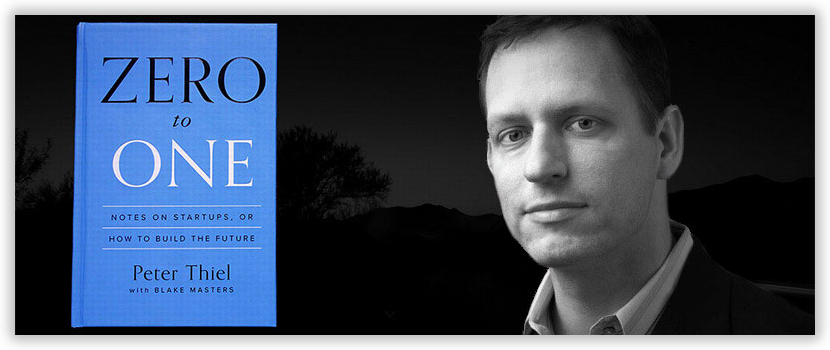Peter Thiel’s Zero to One: Notes on Startups, or How to Build the Future (2014) presents itself as a blueprint for creating successful businesses that move from “zero to one”. As a co-founder of PayPal and Palantir, Thiel offers an insider’s perspective on entrepreneurship, emphasizing monopoly power, contrarian thinking, and technological innovation, and how each of them affect business.
One of Thiel’s most thought-provoking claims is that great entrepreneurs must embrace contrarian thinking. Contrarian thinking means you don’t blindly follow the trend and what most people are doing, but embrace your ideas and believe in them.
Some questionable, contrarian Peter Thiel’s beliefs:
Monopolies Are Good, Not Bad
Thiel’s View: Monopolies are actually beneficial because they allow companies to make long-term investments in innovation. He argues that the most successful businesses (e.g., Google, Amazon, Facebook) create monopolistic advantages by offering unique, high-value products that no one else can replicate, and by creating the monopoly, they can spend less time competing on the market and spending more time to focus on innovation and its workers. Peter also states that monopolies in “his theory” aren’t bad because they will whatsoever be replaced by new monopolies as time goes on.
Correct: On paper this sounds right, but with numerous examples in real life we can see this theory doesn’t really hold up. How many monopolies exist today. Not many. That’s because huge companies that got to the top will do anything to stay there, including destroying upcoming competitors by any way possible, be it buying them, or literally killing whistleblowers (Boeing). He writes that monopolies have more time to concentrate on innovation, because they have no competition. That is also something that sounds ok on paper, but doesn’t exist in real life. Why would McDonald’s or Disney innovate? They don’t need to, they have no reason for it, they are already on top and already successful, why would they change anything? Innovation comes from competition, trying to be better than the other person, trying to convince someone to buy your product over other’s products, so you have to come up with something new, to intrigue buyers. Monopolies already have all the buyers, so they don’t innovate. The cleanest example I can think of is Disney right now. Every single movie is the same, all animation is the same, no new style, they only make retellings of old stories, nothing new, no innovation.
Competition Is for Losers
Thiel’s View: Competition erodes profits and makes businesses fight over the same pie instead of expanding the pie. Instead of competing in an existing market, startups should aim to create entirely new markets where they can be the dominant player.
Correct: Thiel sees it as no competition = more time to focus on innovation, and that really doesn’t exist in the real world today. It is also incredibly difficult for startups to even get to such high positions on the market, because of the monopolies stopping them.
The Education System Is Overrated
Thiel’s View: Higher education is a bubble, and many students accumulate debt without gaining real-world skills. He even created the Thiel Fellowship, which pays young entrepreneurs to drop out of college and start companies instead.
Correct: A college degree absolutely doesn’t guarantee anything, that you will be good at your job, that you will even have a job (expect if you’re studying to be a doctor or a lawyer, then you absolutely have to have a college degree), but business what you need is motivation. You can go to college, but if you’re not interested, not reading books on your own, not studying on your own, not trying on your own, you will not be as successful as someone who didn’t go to college, but has the absolute motivation to succeed.
The Future of Innovation Is Stagnating
Thiel’s View: Outside of software and the internet, technological progress has actually slowed down. He argues that industries like energy, transportation, and medicine have seen less radical innovation than expected and that society needs more risk-taking in these fields.
Correct: While you can see some innovation in industries like transportation, for example self-driving cars, there definitely has been less of a jump in evolution of these industries compared to the evolution of software and internet industries. I believe the reason behind that is that monopolies, who mainly control not-online industries, prevent startups from participating and succeed in that traffic, so most startups go somewhere where they can succeed, where there isn’t as much control and monopolies, and that’s internet and software.
Globalization Is Not the Future—Technology Is
Thiel’s View: Globalization is just copying existing ideas and spreading them worldwide (going from “1 to n”), whereas real progress comes from breakthrough technology that creates entirely new solutions (going from “0 to 1”).
Correct: Yes, Thiel is correct, progress comes from new, innovative technology that creates new solutions, but progress isn’t just that. The definition of progress: “Develop towards an improved or more advanced condition.” So if somebody takes an already existing technology, or idea, and changes it a bit, improves it, they still make progress. Going from nothing to one thing (0 to 1) is progress, but going from one thing to another thing, or from one thing to two, or more similar things, that are slightly better (1 to n) is also progress. I believe the future is further globalization, so that everyone in the world can work with whomever they want, innovate whatever they want, and solve whatever problems they want, no matter where they are. Technology shouldn’t oppose globalization, it should help it. They aren’t two different forces that work against each other, but two means for a better world that can’t work without each other.
Individuals Over Many
Thiel’s View: “Brilliant individuals” are the driving force behind technological revolutions.
Correct: While having strong leadership and good, bold ideas is important, one person can not achieve many things. Thiel’s thinking oversimplifies the part collaboration holds in innovation. History demonstrates that many breakthroughs—such as the development of the internet or advancements in medicine—result from collective efforts rather than just one genius person. Thiel’s brilliant individuals who succeed on their own basically don’t exist. While he celebrates people such as Steve Jobs and Elon Musk, who are good, capable, innovative managers, he overlooks the funding, money, teamwork, infrastructure that enabled them to succeed.
While Zero to One provides a good structure for understanding entrepreneurship, it should not be taken as unquestionable rules. A more nuanced approach—one that acknowledges the importance of collaboration, regulation, and ethical considerations—would provide a more balanced and realistic vision of the future. People should engage critically with Thiel’s ideas, adopting what is useful while remaining wary of his more ideological statements.

